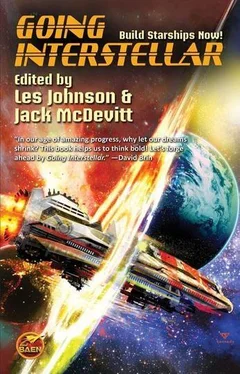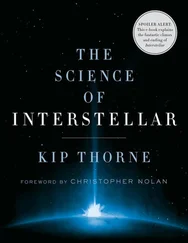Liquid water meant life. In the solar system, wherever liquid water existed, life existed. In the permafrost beneath the frozen rust-red surface of Mars, in the ice-covered seas of the moons of Jupiter and Saturn, in massive Jupiter’s planet-girdling ocean: wherever liquid water had been found, life was found with it.
Half a dozen robotic probes confirmed that liquid water actually did exist on the surface of Gliese 581g, but they found no evidence of life. Not an amoeba, not even a bacterium. But that didn’t deter the scientific hierarchy. Robots are terribly limited, they proclaimed. We must send human scientists to Gliese 581g to search for life there, scientists of all types; men and women who will sacrifice half their lives to the search for life beyond the solar system.
Ignatiev was picked to sacrifice the last half of his life. He knew he would never see Earth again, and he told himself that he didn’t care. There was nothing on Earth that interested him anymore, not since Sonya’s death. But he wanted to find something, to make an impact, to keep his name alive after he was gone.
Most of the two hundred scientists, engineers and technicians aboard Sagan were sleeping away the decades of the flight in cryonic suspension. They would be revived once the scoopship arrived at Gliese 581’s vicinity. Only a dozen were awake during the flight, assigned to monitor the ship’s systems, ready to make corrections or repairs if necessary.
The ship was highly automated, of course. The human crew was a backup, a concession to human vanity unwilling to hand the operation of the ship completely to electronic and mechanical devices. Human egos feared fully autonomous machines. Thus a dozen human lives were sacrificed to spend five decades waiting for the machines to fail.
They hadn’t failed so far. From the fusion power plant deep in the ship’s core to the tenuous magnetic scoop stretching a thousand kilometers in front of the ship, all the systems worked perfectly well. When a minor malfunction arose, the ship’s machines repaired themselves, under the watchful direction of the master AI program. Even the AI system’s computer program ran flawlessly, to Ignatiev’s utter frustration. It beat him at chess with depressing regularity.
In addition to the meaningless title of senior executive, Alexander Ignatiev had a specific technical task aboard the starship. His assignment was to monitor the electromagnetic funnel that scooped in hydrogen from the thin interstellar medium to feed the ship’s nuclear fusion engine. Every day he faithfully checked the gauges and display screens in the ship’s command center, reminding himself each time that the practice of physics always comes down to reading a goddamned dial.
The funnel operated flawlessly. A huge gossamer web of hair-thin superconducting wires, it created an invisible magnetic field that spread out before the starship like a thousand-kilometer-wide scoop, gathering in the hydrogen atoms floating between the stars and ionizing them as they were sucked into the ship’s innards like a huge baleen whale scooping up the tiny creatures of the sea that it fed upon.
Deep in the starship’s bowels the fusion generator forced the hydrogen ions to fuse together into helium ions, giving up energy in the process to run the ship. Like the Sun and the stars themselves, the starship lived on hydrogen fusion.
Ignatiev slid the door of his quarters shut. The suite of rooms allotted to him was small, but far more luxurious than any home he had lived in back on Earth. The psychotechnicians among the mission’s planners, worried about the crew’s morale during the decades-long flight, had insisted on every creature comfort they could think of: everything from body-temperature waterbeds that adjusted to one’s weight and size to digitally controlled décor that could change its color scheme at the call of one’s voice; from an automated kitchen that could prepare a world-spanning variety of cuisines to virtual reality entertainment systems.
Ignatiev ignored all the splendor; or rather, he took it for granted. Creature comforts were fine, but he had spent the first months of the mission converting his beautifully-wrought sitting room into an astrophysics laboratory. The sleek Scandinavian desk of teak inlaid with meteoric silver now held a conglomeration of computers and sensor readouts. The fake fireplace was hidden behind a junkpile of discarded spectrometers, magnetometers and other gadgetry that Ignatiev had used and abandoned. He could see a faint ring of dust on the floor around the mess; he had given the cleaning robots strict orders not to touch it.
Above the obstructed fireplace was a framed digital screen programmed to show high-definition images of the world’s great artworks—when it wasn’t being used as a three-dimensional entertainment screen. Ignatiev had connected it to the ship’s main optical telescope, so that it showed the stars spangled against the blackness of space. Usually the telescope was pointed forward, with the tiny red dot of Gliese 581 centered in its field of view. Now and then, at the command of the ship’s AI system, it looked back toward the diminishing yellow speck of the Sun.
Ignatiev had started the flight by spending most of his waking hours examining this interstellar Siberia in which he was exiled. It was an excuse to stay away from the chattering young monkeys of the crew. He had studied the planet-sized chunks of ice and rock in the Oort Cloud that surrounded the outermost reaches of the solar system. Once the ship was past that region, he turned his interest back to the enigmatic, frustrating pulsars. Each one throbbed at a precise frequency, more accurate than an atomic clock. Why? What determined their frequency? Why did some supernova explosions produce pulsars while others didn’t?
Ignatiev batted his head against those questions in vain. More and more, as the months of the mission stretched into years, he spent his days playing chess against the AI system. And losing consistently.
“Alexander Alexandrovich.”
He looked up from the chessboard he had set up on his desktop screen, turned in his chair and directed his gaze across the room to the display screen above the fireplace. The lovely, smiling face of the artificial intelligence system’s avatar filled the screen.
The psychotechnicians among the mission planners had decided that the human crew would work more effectively with the AI program if it showed a human face. For each human crew member, the face was slightly different: the psychotechs had tried to create a personal relationship for each of the crew. The deceit annoyed Ignatiev. The program treated him like a child. Worse, the face it displayed for him reminded him too much of his late wife.
“I’m busy,” he growled.
Unperturbed, the avatar’s smiling face said, “Yesterday you requested use of the main communications antenna.”
“I want to use it as a radio telescope, to map out the interstellar hydrogen we’re moving through.”
“The twenty-one centimeter radiation,” said the avatar knowingly.
“Yes.”
“You are no longer studying the pulsars?”
He bit back an angry reply. “I have given up on the pulsars,” he admitted. “The interstellar medium interests me more. I have decided to map the hydrogen in detail.”
Besides, he admitted to himself, that will be a lot easier than the pulsars.
The AI avatar said calmly, “Mission protocol requires the main antenna be available to receive communications from mission control.”
“The secondary antenna can do that,” he said. Before the AI system could reply, he added, “Besides, any communications from Earth will be six years old. We’re not going to get any urgent messages that must be acted upon immediately.”
Читать дальше












